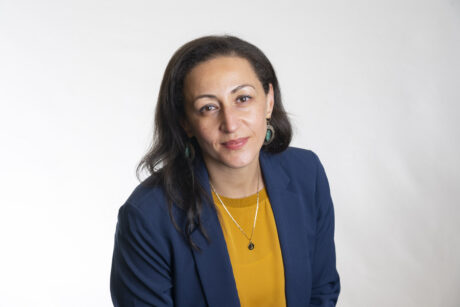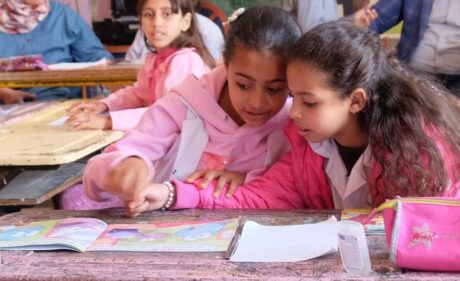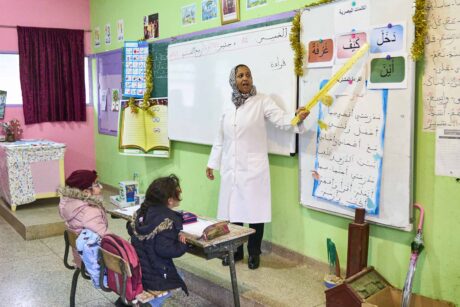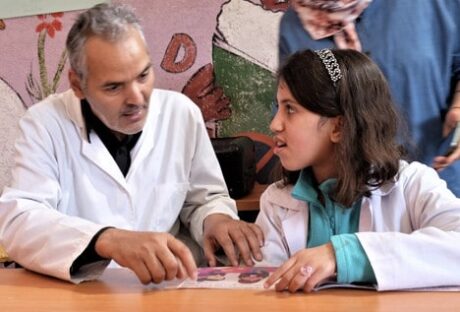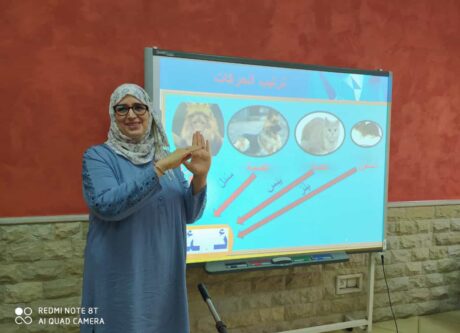For people around the world, 2020 will be remembered for the COVID-19 outbreak and how it transformed the way we live, learn, work and interact with one other. As the pandemic spread, we found ourselves propelled into the “future of work,” having to suddenly adjust and adopt new ways of doing our jobs. For those of us in education development, this meant not just shifting how we work personally but also how our programs deliver services and collaborate with partners.
The crisis brought into sharp focus USAID’s first Stratégie numérique, formally published in April 2020, and its goal of strengthening digital ecosystems and using technology to achieve development outcomes, including in education. Within the USAID-funded Lire pour réussir – Programme national pour la lecture au Maroc, we had a challenge – and opportunity – to put this strategy into practice and respond to the pandemic with digital innovation.
NPR pivoted its work to ensure our program continued to reach teachers and students in Morocco, even though in-person training workshops and meetings were no longer possible.
D'abord, we had to develop ways to convert our teams to a digital mindset and adopt new digital tools that enabled us to continue to work together remotely and seamlessly. Alors, we redesigned some of our interventions to include digital tools for partners, teachers and students to utilize to improve learning outcomes.
Plus important encore, we were very aware that some marginalized groups, including people living in remote or rural areas, people with disabilities and people with low digital literacy, might be excluded from the digital ecosystem. NPR worked to rethink interventions to ensure that they are inclusive and accessible to the widest number of beneficiaries.
By the end of the year, NPR a non seulement réorienté ses programmes pour s'adapter à la réalité de la pandémie, mais a également fait de grands progrès en améliorant l'accès à des outils éducatifs de qualité et a ouvert de nouvelles voies dans les méthodes de prestation des programmes d'études en arabe au Maroc..
Le premier matériel de lecture complémentaire numérique au Maroc (MRS) plate-forme
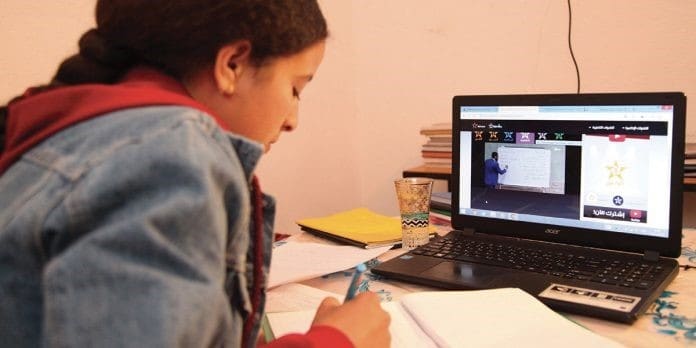
NPR a noué un partenariat entre le ministère marocain de l’Éducation et la bibliothèque numérique Assafeer, basée à Dubaï, pour développer la première plateforme de lecture numérique au Maroc dédiée exclusivement aux élèves du primaire.. Cette plateforme contient 100 des titres illustrés classés par niveau, edited to include Moroccan terms and cultural references and include story lines and illustrations that promote Gender-Equity and Social Inclusion (GESI) principles. This platform provides elementary school-level children with free access to these reading materials, so they can continue to read and learn outside of the classroom as well as develop their digital literacy skills.
Ensuring equal access of deaf students to Morocco’s educational digital tools
When schools closed in late March, the Moroccan educational system immediately went online. Morocco was already one of the few countries in Africa to have a dedicated educational TV channel and an online platform where school lessons of all levels were broadcasted daily.
Cependant, students who are deaf or hard of hearing were not able to benefit from these educational resources due to the absence of Moroccan Sign Language interpretation. Dans quelques mois, NPR engaged in discussions with the ministry and recruited a number of MSL teachers who provided interpretation for all elementary school subjects for grades 1 à 6. Over the summer, the rollout of the interpretations began with grade 6 lessons that were posted on the TelmidTice and TaalimTice online platforms and broadcasted nationally on the Moroccan channel Al Amazighia. NPR continues to work with the Ministry on translating, recording and producing the remaining lessons, which are scheduled to be completed by July.
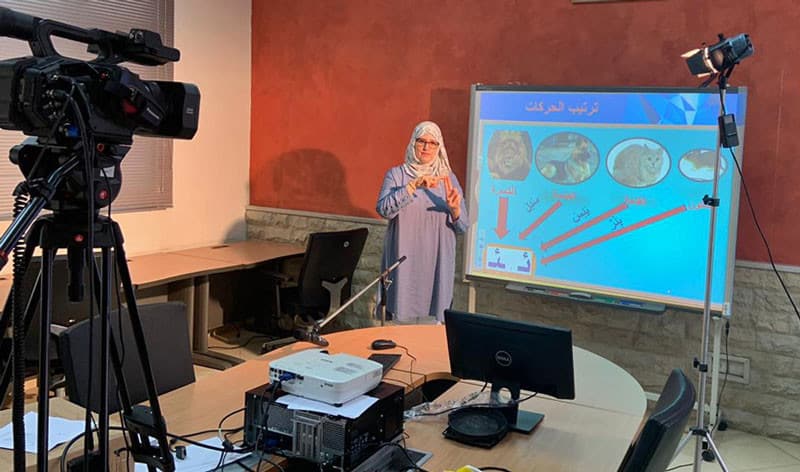
Développer une plateforme numérique de formation des enseignants
Au cours des deux dernières années, NPR a commencé à travailler avec des partenaires internationaux et locaux pour développer un cours en ligne ouvert et massif. (MOOC) en soutien à pré- et formation continue des enseignants. Sur la base du travail de base mis en place avant la pandémie, le ateliers pour concevoir le cours s'est poursuivie virtuellement au cours des derniers mois.
Garantir que les enseignants ayant différents niveaux d’accès à la technologie numérique et à la culture numérique puissent toujours bénéficier du MOOC, NPR a travaillé sur l'intégration des principes de conception universelle pour l'apprentissage afin d'aider à présenter le programme dans un format qui augmente l'engagement et l'apprentissage à distance.. This includes presenting information in different ways to encompass learning styles, using visual or audio cues, and integrating questions at every step to further the user’s ability to navigate the platform and their knowledge acquisition.
Upon completion of the MOOC, primary-level teachers across Morocco will be able to access online training and integrate the new Arabic-language curriculum and instructional methods within their classrooms. The MOOC is designed with self-paced courses and will include downloadable modules that enable teachers to access the courses offline.
These interventions are grounded in USAID’s Digital Strategy, which aims to achieve two core objectives: to improve USAID’s development and assistance outcomes through the responsible use of digital technology; et de renforcer l'ouverture, inclusivité et sécurité des écosystèmes numériques.
Cela est devenu encore plus urgent au cours de l’année écoulée.
Même si la pandémie constitue un défi à de nombreux niveaux et que ses répercussions continueront de se faire sentir, nous pouvons au moins dire que cela nous a obligés à repenser la façon dont nous mettons en œuvre nos programmes et nous a poussé à rechercher des solutions qui intègrent pleinement la technologie numérique et qui ont contribué aux objectifs numériques d’autonomie du Maroc..
Regarder vers l'avenir, Les programmes de NPR devraient continuer à proposer des programmes éducatifs de qualité via des outils numériques qui contribuent à réduire la fracture technologique.. Avec le recours croissant au numérique, les programmes et les politiques devront aborder l’égalité numérique en fournissant un accès égal au haut débit, opportunités de formation aux compétences numériques, and motivating people to acquire those increasingly vital skills.
Linda Wafi is the Project Director for the Reading for Success-National Program for Reading in Morocco.
